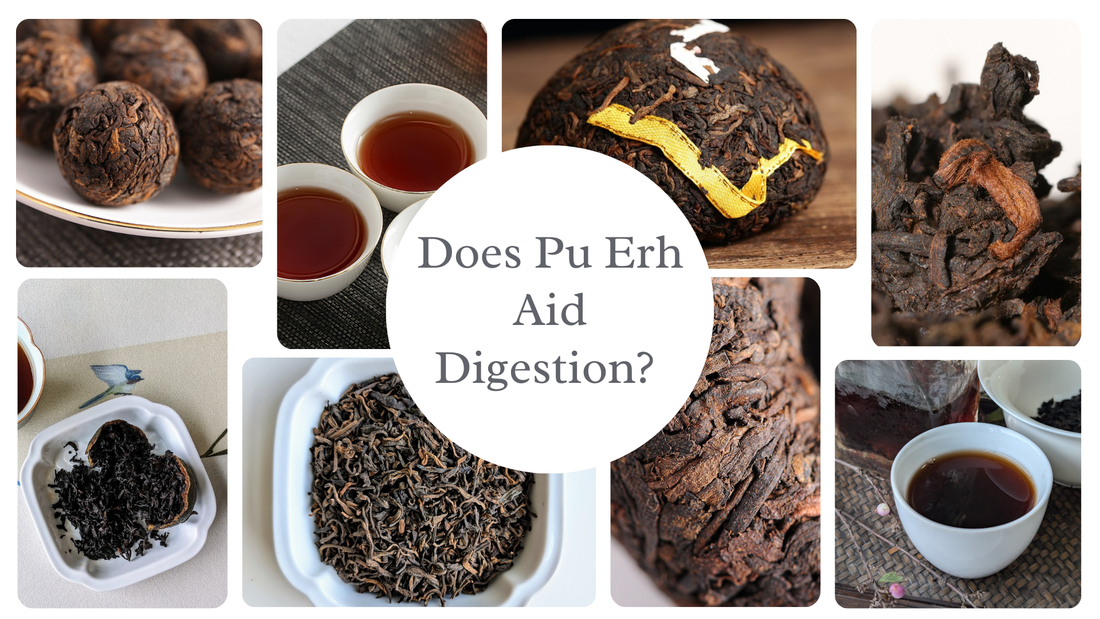Why The Chinese Drink Pu Erh Tea During Dim Sum For Digestion: Here's The Science Behind It

Share
Pu erh tea has long held a special place in Chinese tea culture, and it’s drawn attention for its potential health benefits, especially when it comes to digestion. But what makes this post-fermented tea a good choice to pair with heavy meals? And why is it so underappreciated in the West? To answer that, let’s look at both the science behind it and the rich food tradition of Dim Sum (or 'Yum Cha'), where pu erh has been quietly doing its job for generations.
What is Dim Sum (Yum Cha)?

Yum cha (飲茶 yǐn chá), meaning "drink tea," is a traditional type of gathering that includes tea and food. It is a deeply rooted tradition in southern China, especially in places like Guangdong and Hong Kong. When the gathering happens in the morning, it can also be called zao cha (早茶 morning tea).
On these occasions, families and friends meet at restaurants to enjoy an assortment of small plates called Dim Sum (点心 diǎn xīn), ranging from savory dumplings to sweet custards. As Dim Sum is usually rich and sometimes quite oily, people drink tea to diminish the greasy sensation. Pu erh is one of the most common teas served at yum cha, not just for its flavor, but also because it’s believed to help with digestion, particularly after indulging in oily or heavy dishes.
It's important to note that there are 2 kinds of pu erh tea, which are raw and ripe pu erh, and the latter is served during Dim Sum. For more information about the difference you may read this article 'What is Pu Erh Tea'. Southern Chinese especially love to drink ripe pu erh during or after heavy meals, leaving them feeling more comfortable and less bloated.
How Ripe Pu Erh May Support Digestion

Pu erh tea isn’t just traditionally appreciated: a recent study (1) published in a Chinese tea-specialized journal attests that ripe pu erh tea may help digestion and have a positive effect on the digestive system in general.
In another study (2), researchers from the School of Medicine of Xi'an Peihua College conducted a study on the effect of pu erh tea on gastrointestinal motility. The results showed that pu erh tea can promote and improve gastrointestinal motility, aiding digestion.
Moreover, ripe pu erh may also have some positive effect on weight loss. In a previous article, we summarized other research results on pu erh tea's health effects.

Why Pu Erh Tea Is Not Popular in the West
Founder Sam Lin explains:
While pu erh tea is extremely popular in China, it remains relatively unknown in the West. This is largely because tea education outside of China often focuses on health benefits, particularly those linked to tea polyphenols. Since post-fermented teas like pu erh contain lower levels of tea polyphenols, they’re less frequently highlighted in Western markets. However, this doesn’t mean pu erh tea is less healthy. In fact, it offers unique benefits that complement those of other teas. The post-fermentation process of pu erh tea enhances the activity of beneficial microbes, which play a vital role in supporting a healthy gut microbiome and improving digestion. While it may not provide the same polyphenol-related advantages as other teas, pu erh tea contributes significantly to digestive health, which is an essential component of overall well-being.
In conclusion, while pu erh isn’t a cure-all, there’s a reason why the ripe version is traditionally served after big meals: it may help the body process heavier foods more efficiently, and that’s especially relevant in the context of Dim Sum. If you’re looking for a tea that’s easy on the stomach and pairs beautifully with food, a warm cup of ripe pu erh might be just what you need.
There will soon be another article discussing the benefits of pu erh tea on cholesterol and microbial activity. Stay tuned to discover more about this fantastic beverage.
(1) Yang Rui, Deng Xiaocui, et al. Research progress on the protective effect of active ingredients of Pu'er cooked tea on the stomach 普洱熟茶活性成分对胃的保护作用研究进展 (J). China Tea Processing 中国茶叶加工, 2024 (1): 68-77.
(2) Meng Tingting, Chen Jiankang, Shang Congshan, et al. Effects of Pu'er tea on gastrointestinal motility 普洱茶对肠胃运动功能的影响 (J). Journal of Clinical Medical Literature 临床医药文献杂志 (Electronic Edition), 2017, 4 (41): 7932-7932.
